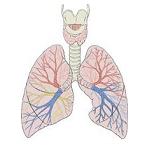The first step we are going to take to know the meaning of the term dyspnea is to discover its etymological origin. In this case, we can establish that it is a word that derives from Greek, exactly from “dýspnoia”, which means “difficulty breathing” and that it is the result of the sum of three parts:
-The prefix “dys-”, which indicates “difficulty”.
-The noun “pnoia”, which can be translated as “lung”.
-The suffix “-ia”, which indicates “quality”.
And that Greek word, in turn, comes from “dyspnoos”, which was used by figures such as Sophocles or Hippocrates to indicate “who breathes painfully”.
The concept is used to name the disorder or difficulty that affects breathing .
 Dyspnea is generally associated with shortness of breath . This poor breathing causes discomfort in the person, generating subjective sensations whose intensity varies depending on each situation.
Dyspnea is generally associated with shortness of breath . This poor breathing causes discomfort in the person, generating subjective sensations whose intensity varies depending on each situation.
Among the clearest symptoms of dyspnea are the sensation that the person feels that the air they are breathing is not enough, that they may feel restlessness or anxiety and may even experience other symptoms such as cough, tremor, wheezing...
Physiological, environmental and psychological issues affect dyspnea, which once produced can lead to the development of various behaviors and responses . Depending on its characteristics, several types of dyspnea can be differentiated.
Dyspnea at rest is recorded when the person is still. Exertional dyspnea , on the other hand, occurs after intense physical activity. Paroxysmal nocturnal dyspnea arises while the individual is sleeping and ends up waking them up due to lack of air. One can also talk about recumbent dyspnea , which is reversed when the subject stands upright.
Pneumothorax, emphysema, bronchospasm, heart disease, asthma or cancer can be reasons for dyspnea. Even an allergy, a panic attack or being in a highly polluted environment can lead to respiratory distress. Treatment of the root cause, in short, is essential to reverse the problem.
At a general level, to reduce or reverse dyspnea, it is recommended to leave poorly ventilated places with large crowds of people, stay away from smoke and not smoke. In some cases, the doctor may even order additional oxygen .
In particular, when you are next to a person who suffers from dyspnea, what you have to do is stay by their side and convey peace of mind. It is important that they feel air on their face so you can open a window. In addition, it is also important that you put yourself in the position that feels most comfortable and help you relax. Of course, it is advisable to immediately take that person to the doctor so that he or she can properly examine him or her and establish a diagnosis as well as the appropriate treatment.
